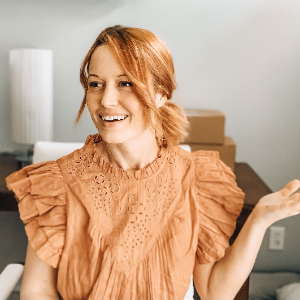Minimalism Is For Rich People – My Response
Nov 08, 2023
Is minimalism for the rich?
Or is minimalism for the poor?
Safe to say, there’s a lot of confusion surrounding who lives a minimalist lifestyle. But before we jump into it, let me start by saying that I’ve avoided this topic for a long time, despite wanting to dive into it.
The reason is that, in my own experience, it can draw in a lot of negativity.
Now, I don’t mind dipping my toes into some of the more controversial topics out there, but I try to avoid discussions that create a lot of negativity or divisiveness. That is not the space I want to create.
Part of that comes from the fact that adopting a minimalist lifestyle has had a domino effect on my life. In creating a more positive environment, I’ve naturally become more positivity-focused.
Minimalism starts as a journey of being more intentional with your belongings. But to be intentional, you must take note of what you value.
Once you adopt a minimalist lifestyle and start being intentional with your belongings and time, you naturally avoid negative things. I’m all about looking forward and making positive transformations. 🙌
So Then, Why Discuss This Debate?
From personal experience, whether in some of the comments on my content or my emotional response to reading things, the aggressive stereotypes of minimalism tend to stir feelings of inner conflict.
One of the most misleading stereotypes I’ve heard is that minimalism is for the rich contemporary white woman who can afford all the “fancy” things.
We can all agree there’s already enough division happening worldwide. There’s no need to create more than we already have.
Therefore, I don’t want this topic to aim at pointing fingers or pitting one opinion against another. The aim is to bring attention to the perspectives I’ve seen about whether minimalism is for the rich or the poor.
And to share my personal experience with both sides of the coin!
No matter what anyone’s opinion is, we’re all just trying our best to enjoy life and be happy. I want this community to feel like a safe place for everyone to share their thoughts and feelings positively. 💓
With that said, here is my experience (as a minimalist) on this debate.
My Financial Experience With Minimalism
Let me start by saying that when I first started practicing minimalism, I was financially poor.
Like, “go on a rice-and-beans diet to save money for basic needs” poor.
It seems contradictory, considering the stereotype that minimalism is for the rich. But initially, minimalism was assumed to be for poor people.
What’s funny is that when I first started living a minimalist lifestyle, I worried people would think I was doing it because I was poor, not because I wanted to.
Back then, people would comment on my content, saying things like:
- “Being poor must be in style.”
- “Glad minimalism is trending because I can’t afford anything anyway!”
So you can imagine my surprise when I later heard the stereotype that minimalism is for the rich and privileged.
So, Who’s Right? Is Minimalism For The Rich Or The Poor?
Minimalism is for anyone who wants to take control of their environment by removing excess clutter from their life.
And who has clutter? Everyone.
That’s right, minimalism is for the rich, the poor, and everyone in between.
Clutter: A Universal Struggle
Some argue that clutter is a problem only poor people face because they can’t afford to get rid of items they might need later.
Others claim rich people are just as prone to clutter but have more space to store their items—or buy too much because they can afford it.
At some point in our lives, we all face clutter. The difference lies in the type of things we purchase or collect.
Clutter is stressful, no matter your financial situation, so anyone with clutter can benefit from learning ways to address and avoid it.
1. Saving vs. Spending
There have been times when I’ve had an abundance of money and others when I’ve had next to none.
Your approach to clutter and minimalism will vary depending on your financial situation.
Minimalism for Financial Wellness
Some argue minimalism is for the rich because it requires the privilege of being able to choose whether to buy or not. For instance, building a quality capsule wardrobe might cost about $1,000—an amount many can’t afford.
However, even those with limited financial resources often spend money on things they don’t need. Minimalism can help by encouraging better decisions, saving money, and reducing stress.
2. The Quality vs. Quantity Debate
If you know me, you know I prioritize making quality purchases. Quality items last longer and don’t need replacing as often, saving you money in the long run.
Thrifting and Budget-Friendly Minimalism
Minimalism doesn’t require wealth to succeed. Many high-quality items can be found at thrift stores, consignment shops, or through online marketplaces.
When I started my minimalist lifestyle, I didn’t own many high-quality items. But with time, I’ve been able to incorporate them into my life.
3. Culture and Style
Minimalism often faces criticism for being “bland” or stripping away culture and personality.
But minimalism is entirely customizable. Whether you prefer boho decor, sleek modern designs, or anything in between, minimalism allows you to create a space that reflects you—without the unnecessary clutter.
Reframing the Minimalism Debate
The debate over whether minimalism is for the rich or poor is rooted in stereotypes that don’t reflect the truth. Minimalism is for anyone, regardless of financial background, who wants to live intentionally and reduce stress.
If you’re ready to explore minimalism further, check out my masterclass, where I’ll give you tools to create a clutter-free space that supports your lifestyle and goals.



